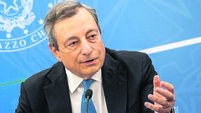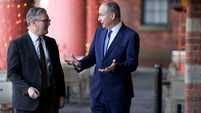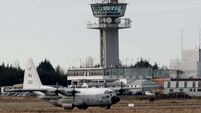Putin beating the anti-West drum

NOW that Russia president Vladimir Putin has swallowed Crimea, the question becomes: What if the peninsula doesn’t satisfy his appetite for new Russian territory? What if the only thing that will satiate his hunger for power is the goulash known as eastern Ukraine? Or does he then move on to Moldova, and then on and on?
Indeed, while the world watched the protests in Kiev and the Sochi Olympics last month, the Moldovan territory of Gagauzia quietly held a referendum about whether or not to join Russia if the rest of the country opts for stronger ties to the European Union. Its citizens, just like those in Crimea, have argued that they would be economically better off on Putin’s planet, rather than as meagre satellites in the Western solar system.
The prospect of joining Russia sounds far better on paper than in reality. The promise of benefits is likely to evaporate when robust Western sanctions throw Russia’s economy into a steeper downturn. The ruble has already lost almost 9% of its value this year against the dollar. Many have argued (myself included) that very soon Putin won’t be able to survive the international blowback.
But what if his long-term strategy is creating a new global conservative bloc, building an iteration of the Cold War that pits decadent, neo-colonial Western democracies against everyone else?
By beating the anti-West drum and turning the sanctions policy on its head, Putin seeks to mould Russians into an ever more obedient, patriotic public — forced to give up many of their post-Soviet amenities for the sake of glorifying mother Russia.
It seems to be working. Under Putin, 63% of the population see their country as a “great power,” the highest in recent years. In this Russia, which is separate from the West, Putin can firmly play the king of the jungle. His jungle, however, is not just Russia, but a whole new world order he wants to establish.
It’s clear now that by 2008, Russia, particularly Moscow, began to resemble Byzantium, the storied centre of Orthodox Christianity — only with more supermarkets and Mercedes Benzes. A double-headed eagle, the imperial coat of arms that the Russian tsars appropriated from the Byzantine Empire,now appears everywhere: on subways, in government buildings, in Red Square, even atthe Bolshoi Theatre.
When Byzantium collapsed, old Moscovia assumed its responsibility to lead Eastern Christians against Western decadence and toward spiritual heaven on earth. Now Moscow can re-assume this role.
Under Putin, the Soviets’ secular society began to rethink its place in a world in which conservative religious beliefs take precedence over civic norms. This helps explain why two members of the feminist punk group Pussy Riot were sentenced in 2011 to almost two years imprisonment for performing their anti-Putin prank “prayer” in Moscow’s main Cathedral of Christ the Saviour.
Even given this harsh environment, the Kremlin’s new anti-gay propaganda law seemed too severe and unenlightened for a country that effectively participated in Western institutions — most notably (until Monday) the G8, a group of progressively developed nations.
Then, just before the Sochi Olympics, Putin announced that Russia will become a bastion of “conservative values.”
Putin had also skillfully reclaimed his place on the world stage by forcefully standing up to the United States. During the scandal over the National Security Agency’s domestic surveillance, Putin was able to stick it to the Americans by granting asylum to the whistleblower Edward Snowden. Putin also parlayed his role as key supporter of Syrian president Bashar al-Assad into negotiating a surprise chemical weapons deal. Forbes selected Putin as the most powerful leader of 2013.
Reimagining the post-Cold War order by creating a new “Eastern” bloc to counter the dominant Western secular democracies is perhaps why Putin has continued to support the vile Assad regime in Syria. Now that Egypt has a new military dictatorship, which appears to prefer Russia to the United States, maybe Moscow and Cairo can form a new Warsaw Pact — based on conservative values, oil and arms. Iran might also sign on.
China, the world’s second-largest economy, would be a nice addition to this collection of anti-democratic states. Beijing has its own grievances with the West — the G-7’s tendency to moralise and lecture about human rights and a free press is just part of it.
Granted, this strategy might not work. China is eager to become a singular global leader and Iran appears to be trying to “reset” relations with the West. But who knows? If Putin can offer Beijing a territorial bribe — the most populous nation has been looking to “steal” land from Russia for years — and extend Tehran some nuclear expertise, it might seal the deal.
Yet the result would still mean the end of Russia as we know it. His ideology, however, offers no future, no constructive formula and no human benefits.
For all the West’s inconsistency and even hypocrisy since the 1991 collapse of the Soviet Union, we have (for the most part) lived in the world of comfort and civility, not ideological fervour and militant rejection of legal and economic institutions. On a larger scale, this benefits all.
Sadly, Putin can’t make the same claim.















